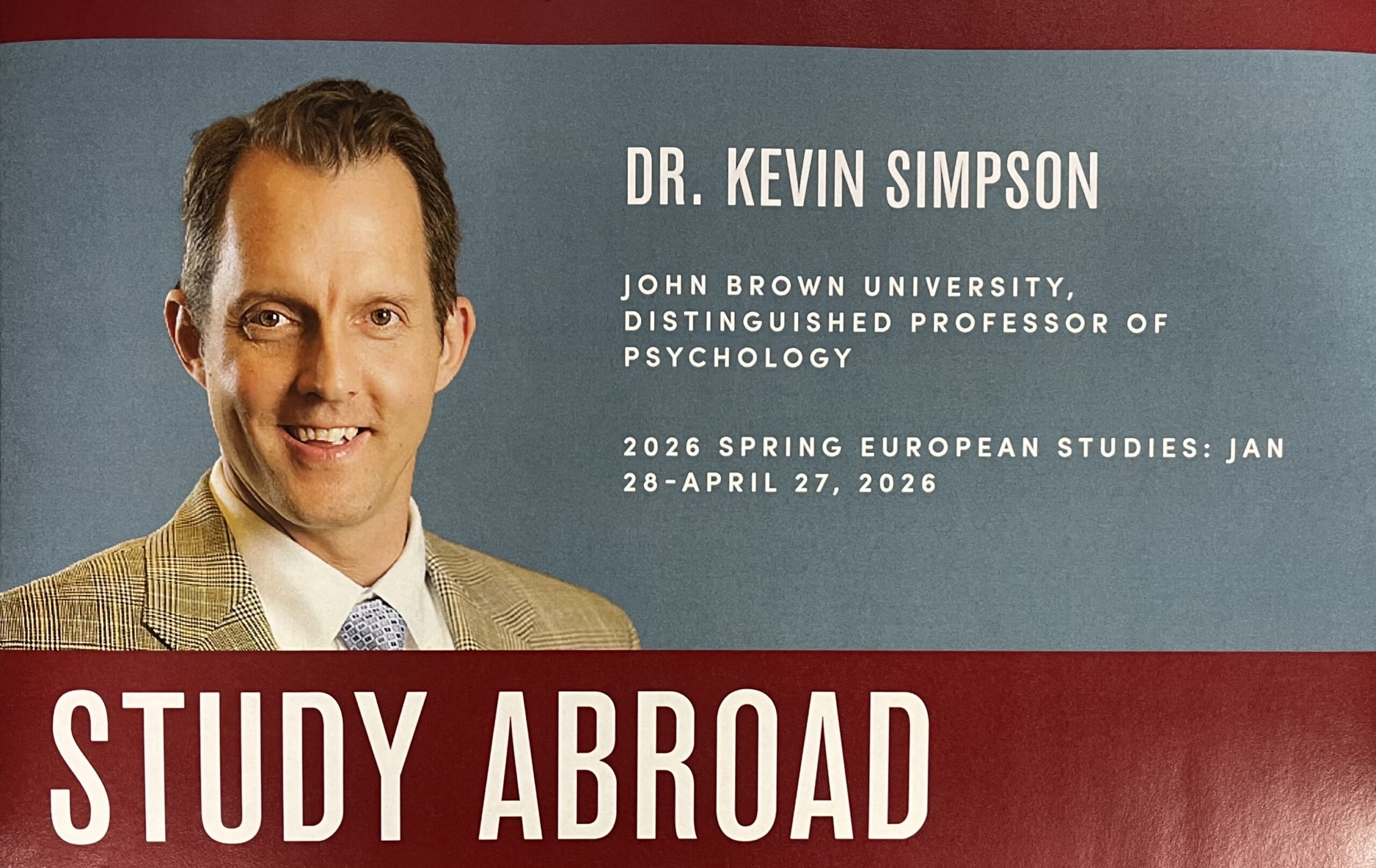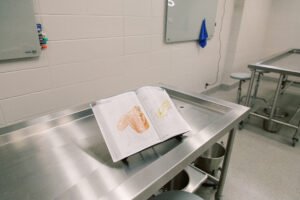This spring, Dr. Kevin Simpson, a distinguished professor at John Brown University, will be the sponsor of the Oklahoma Christian study abroad semester trip to Vienna. Simpson will also be teaching a course in Vienna on the psychology of the Holocaust.
Simpson said, “I’ve been here [at John Brown], it’s my 13th year. I’m actually an alum of JBU. I graduated some time ago, but came back after teaching in Portland, Oregon for 12 years at a Lutheran College called Concordia. And yeah, being back in my alma mater has been fantastic for all sorts of reasons.”
Simpson has a broad and distinguished background in the field of psychology as an educator, author, historian, and even in clinical psychology.
Simpson said, “I was actually trained to be a therapist. I worked a lot in college counseling centers, a number of rotations in private hospitals, community mental health clinics, that sort of thing. But [I] also discovered teaching right about the same time. So I was teaching while I was in graduate school and really fell in love with it. Loved the classroom, loved the give and take, loved watching students kind of mature and grow, both as people, but also as thinkers and even spiritually.”
Simpson has connections with Oklahoma Christian which set him up for the opportunity to serve as the sponsor of the study abroad trip.
“I had a sabbatical coming up… and I was looking for opportunities to do some sort of Holocaust education,” Simpson said. “My daughter graduated from OC. Gosh, was it four years ago, I think at this point, so I’d spend a lot of time on the campus going to spring sing events, soccer matches. My daughter was a player there, so I know OC at least a little bit,” Simpson said. “I taught in Vienna when I was actually a professor in Portland, way back in 2011, and just fell in love with the city and was looking for a way to get back there. And I knew about OC’s program, Das Millicanhaus, as well. I had some connections with the International Studies Office Director, John Osborne, and I just reached out to volunteer my time,” Simpson said. “I was willing to teach my psychology of the Holocaust class for free, just as a volunteer thing, in exchange for just if they’d be willing to put me up in an apartment. So a little bit of horse trading there, as they say. But it just kept turning into more and more opportunity… John asked, probably two months later, if I was willing to take on more of a mentor role, more of a formal, established role within the program and I jumped at the chance,” Simpson said.
Simpson has taken a special interest in the history and psychology of the Holocaust as a professor and researcher in the field.
“So from the moment I started teaching the psychology of the Holocaust, it was usually in partnership with one of my history colleagues, especially when I was back in Portland, Oregon, and I eventually completed a number of fellowships and seminars in Holocaust studies so that I felt competent and prepared to teach a class by myself. And I’ve been doing that ever since probably 2012, 2013. Without that, I think I’d just be a psychologist dabbling in history, so I want to make sure I get it right and do the field justice,” Simpson said. “And I’ve always had a fascination with World War Two history. I’m kind of one of those old guys, I think at this point, I wasn’t when I started, but an old guy who was fascinated with WWII history. People in the field of history have been very generous with me in terms of welcoming me into different conferences that I’ve been a part of. But psychology really has some important things to say or to bring to the table in terms of explanatory power, meaning the whys and the hows of some of these things,” Simpson said.
Simpson is the author of Soccer Under the Swastika: Stories of Survival and Resistance During the Holocaust, a book which focuses on the role that the game of soccer played during WWII.
“Soccer has kind of been in my blood. It’s been a passion of mine. I follow the game around the world, but especially in England, and as I was prepping for the psych of Holocaust class, I kept coming across testimonies, and especially photographs of people playing soccer in camps and ghettos. And I was astounded by this, because these were places meant to break you down, to dehumanize to separate you from society. And there’s one photo in particular. There was just six months into the Nazi reign, way back in 1933 these guys running around in ragged clothes, barefoot. It’s in the camp at Dachau, which is in Munich, actually not far from the Vienna center for OC and this was originally a propaganda photo, but you can see the power of sport in this instance, to try to manipulate public perception on how people were being treated.”
Simpson has had the opportunity to teach students about his knowledge of psychology with a focus on the ways sport was used by people during the Holocaust, which has been a unique way to reach a broader audience.
Simpson said, “I’ve been very grateful again, because it’s opened up doors for teaching the Holocaust to kids who maybe are more interested in the soccer or the sport. And I love that part of it too. It’s a way to get these stories and memories in front of people who might not otherwise be interested. For me, a lot of Holocaust education is all about remembrance. How do we tell the stories of people who can’t speak for themselves? How do we hold on to their memory, people we’ve never met who lived decades before us, but we can keep telling their stories, because really, the Nazis wanted to eradicate their stories, and this is a way to push back against that.”
Students attending the spring study abroad trip next semester have the unique opportunity to take Simpson’s class on the history of the Holocaust in a place that was very influential to the content of the class.
Simpson said, “We’re going to take full advantage of being in Vienna, of course, so we use, as they say, the city as a textbook. And so we’ll have a lot of our class periods, going out into the city, looking at memorials, looking at sites where certain historical events happened. A big part of the trip should include a visit to Poland… We’ll coordinate a visit to Auschwitz. So that’s a really sobering couple of days when we’re in Poland and we see Krakow, a beautiful city that’s been preserved over the years. But then just up the road is the Auschwitz Birkenau extermination camp.” Simpson said, “We’ll get out of the classroom quite a bit, but a lot of the readings I have will help us do a deep dive into the psychology of the perpetrators, the bystanders, of course, the victims. We’ll talk about the social conditions, all the social psychology of that. [The class in Vienna is] very similar to what I teach [at John Brown], but we have the wonderful benefit of getting out of the classroom and getting out into the city, visiting a synagogue, looking at some of the memorials around town.”
Simpson will be heading to Vienna this spring with Oklahoma Christian to dive into psychology, history, and culture in Austria and beyond.











Be First to Comment